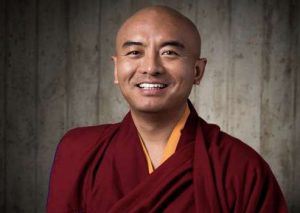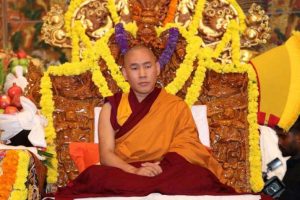
The Korean Seon (Zen) master Venerable Pomnyun Sunim (법륜스님) wears many hats: Buddhist monk, teacher, author, environmentalist, and social activist, to name a few.* As a widely respected Dharma teacher and a tireless socially engaged activist in his native South Korea, Ven. Pomnyun Sunim has founded numerous Dharma-based organizations, initiatives, and projects that are active across the world. Among them, Jungto Society, a volunteer-based community founded on the Buddhist teachings and expressing equality, simple living, and sustainability, is dedicated to addressing modern social issues that lead to suffering, including environmental degradation, poverty, and conflict.
This column, shared by Jungto Society, presents a series of highlights from Ven. Pomnyun Sunim’s writings, teachings, public talks, and regular live-streamed Dharma Q+A sessions, which are accessible across the globe. The following teaching was given in Atlanta, Georgia, on 4 May 2024. This article is the fifth in a special series taken from Ven. Pomnyun Sunim’s 2024 Dharma tour of Asia-Pacific, Europe, and North America. Titled “Casual Conversation with Ven. Pomnyun Sunim: Come Talk about Life, Wisdom, and Happiness,” the Dharma tour ran from 29 April–21 September 2024, with Dharma talks scheduled in five countries—Australia, Canada, Germany, Japan, and the United States.**
This Dharma Q&A was held at the Korean Cultural Center in Atlanta. Ven. Pomnyun Sunim had previously held a Dharma Q&A here in 2019. This was his first visit in five years, since the COVID-19 pandemic.
After arriving at the venue, Sunim engaged in a conversation with the event volunteers, most of whom were members of Jungto Society, along with about ten non-member volunteers. Sunim briefly described some of the work in which Jungto Society engages.
Enabling everyone to live happily
“During Dharma Q&As, we hold conversations based on the perspective that everyone, regardless of their race, religion, or nationality, may live freely and happily,” Ven. Pomnyun Sunim explained. “These Dharma Q&As, where anyone with personal troubles can come and find liberation through a conversation, are the foundation of Jungto Society’s activities. Because some people find it difficult to practice what they learn from these Dharma Q&As on their own, we run the Happiness School, where anyone, irrespective of their religion, can learn how to be happy. If they find the first four-week course beneficial, they can enroll in the second course and continue for another month. And those who graduate from the two courses of the Happiness School, they can become members of the Happiness Group, which engages in social action in the community. For those who want to learn about Buddhism in a structured way, there’s the Jungto Dharma School. You can become a member of Jungto Society upon graduation or decide to leave after graduating. As a member, you are entitled to attend Weekly Dharma Meetings on Wednesdays and participate in meditation retreats. After attending the Awakening Retreat, you can also participate in the Sharing Retreat and join the pilgrimage to sacred sites in India and Nepal.
“Jungto Society is composed entirely of volunteers. No one receives a salary, including full-time volunteers, because Jungto Society is a community of practitioners.
“Additionally, Jungto Society is heavily involved in social movements. For instance, we started EcoBuddha to promote a campaign to consume less and eat less, which is part of an environmental movement questioning how to live in this age of climate crisis. Globally, we are engaged in humanitarian relief efforts in various countries through Join Together Society (JTS) in Asia and beyond. Currently, we are working on rebuilding schools in earthquake-affected areas of Syria and constructing schools for indigenous and Muslim communities in Mindanao, in the Philippines. These days, we are also making extensive preparations in Bhutan to create a new model for sustainable development, and we are active in many other countries in Asia.
“Furthermore, we have established the Peace Foundation to work for peace on the Korean Peninsula. This week, I plan to visit various US government agencies in Washington, DC, including the State Department and Department of Defense, to discuss with security experts about ways to ensure that war never breaks out again on the Korean Peninsula. We’ve also founded Good Friends to support refugees and protect human rights. We provide various forms of support to help North Korean defectors, Koryo-saram, and foreign workers who settle in Korean society.
While Jungto Society is based on Buddhism, it focuses on initiatives that help people become happy and pursue social justice, rather than carrying out religious activities. Therefore, even Christians can become members of Jungto Society. We never coerce anyone into believing in Buddhism, and as a member, you are free to have any religious faith.”
The group took a commemorative photo, then Sunim attended a meeting with a representative from the Chestnut Family Foundation. Teresa, a former pediatric nurse who is deeply concerned with improving the lives of children, and her husband Ben, the CEO of a global software company based in Atlanta, are regular contributors to helping impoverished children worldwide. They recently donated generously to JTS’s school construction projects in Syria and the Philippines through JTS America.
Sunim expressed his gratitude to them: “Thank you for your support in helping those in need. Your generous gifts have allowed JTS to provide support and relief on a larger scale.”
Teresa mentioned that she knew that Ven. Pomnyun Sunim had visited Bhutan several times and asked why he hadn’t requested funding for those projects: “I’ve been reading A Day in the Life of Sunim and saw that you have visited Bhutan multiple times. I thought that you would request support from our foundation, but you haven’t mentioned anything yet, so we are still waiting.”
“The reason that we haven’t requested any funds for the Bhutan project is that this year is a trial phase,” Sunim replied. “I always experiment first and only request support for things that prove to be effective or necessary. I never say, ‘We want to do this project, so please provide us with the funds.’ For example, in India, Sujata Academy was only shown to people and received donations after we developed a model over several years. In Mindanao, we have been active for 20 years. Similarly, in Bhutan, we first need to conduct pilot projects this year. Even when building a house, we try to do so at a minimal cost because the less money it takes, the more houses we can build. We also try various methods for house repairs, road maintenance, and fencing fields. We are going to experiment with one village at a time: building fences in this village, roads in that one, houses in this village, water supply in that one, irrigation in that village, and schools in that one, and so on, to create samples in about a dozen places. From next year, we plan to work to improve the lives of all residents in one province over a period of five years.
“Even if JTS receives a lot of donations, we can’t use all the money because it must be spent strictly according to JTS principles. No matter how much money is left, if a project doesn’t adhere to our principles, we don’t fund it. For example, when remodeling houses in Bhutan, the local residents must contribute their labor, and the district or county must provide technicians. If the residents don’t make the commitment to work together, we do not support the project no matter how much money we have. But if they are willing, then we provide as much support as is needed.
“There are also doubts about whether sustainable development can be successful. Sustainable development is not something that has a high probability of success in this day and age. In Korea, a lot of people raise questions, saying ‘Human desire is endless, so won’t it be difficult to stop development at an appropriate level?’ The reason I focus on sustainable development in Bhutan is that the living conditions there are poor. Bhutan’s GDP is around US$3,000, just above the threshold of the poorest nations. Nevertheless, the king is governing the country well, keeping the wealth gap small. Traveling around Bhutan, I observe that the people enjoy the living standards of a country with a GDP of around US$5,000; there are no beggars and the streets are clean.
“At JTS, we aim to improve the standard of living, especially in areas that the government can’t address, by working together with the local residents. So there’s no such thing as failure in this approach. And because our support improves people’s lives, our work also broadly falls under relief efforts. We call it sustainable development because we do not support activities that might feed human greed. For example, we support raising 10 chickens, but not large-scale poultry farms and buying feed. We support survival needs, but not personal desires for a better life. It’s not that people shouldn’t have desires; rather, they should manage those themselves. We are pursuing sustainable development based on this perspective, so it cannot fail.
“Whenever we offer support to any country, from the government’s perspective, there’s always a desire for the latest machinery and facilities. I respond by saying: ‘The government can handle those needs, but if there’s something we can work on together to help those who lack even the basic conditions for living, let’s discuss it. It’s not just about providing aid; the community must be involved. If there’s a shortage of materials for someone to repair their own home or for a community to maintain their neighborhood, we will provide those materials.’
“We avoid unilateral support because it does not inspire vitality in people. People need to do their own work to truly come alive. Sustainability isn’t just about environmental issues; it also encompasses enabling self-reliance. If JTS builds a house but the owner can’t maintain it, it’s not sustainable. Hence, we build using locally sourced materials and techniques that the locals can learn and apply themselves. Foreign organizations can’t supply materials indefinitely. Thus, while any projects that we carry out should be environmentally sustainable, it should be conducive to people becoming self-reliant and sustainably maintaining and improving their own lives.”
After an hour of conversation, they ended the meeting, promising to meet again.
It was then time for the Dharma Q&A, which began with an introductory video, before Sunim took to the stage, greeting the audience with a big smile.
Ven. Pomnyun Sunim: What do you think a Dharma talk is? Typically, it’s described as discussing Buddhist doctrines or sutras. However, I don’t see it that way. If we can alleviate our suffering through our conversations, then that can be called a Dharma talk. It remains a Dharma talk even if it doesn’t involve Buddhist doctrines or scriptures, as long as our anxieties vanish when we listen to it. You hear terms like the “words” of Jesus, Confucius, or the Buddha. We don’t call it a lecture because through these conversations, our doubts are resolved and our anxieties disappear. Therefore, I think that it would be beneficial if we talked about our own most challenging issues as topics of conversation.
How can I restore my relationship with my wife
Q: One of my greatest pleasures used to be coming home from work and enjoying a beer while discussing work events, society, and politics with my wife. However, after decades of having such a close relationship, lately, she hardly listens to me, doesn’t prepare snacks for me to have with my beer, and even argues with what I say. Sometimes, she leaves me drinking and talking by myself and goes off on her own. When I go to see what she’s doing, I find her listening to Ven. Pomnyun Sunim’s Dharma Q&As. So these days, I have no joy in my life. How can I bring back the good old times with my wife?”
Ven. Pomnyun Sunim: Do you earn more or less money than you used to?
Q: I earn much more now.
Ven. Pomnyun Sunim: So you mean to say that your wife can live comfortably without you now?
Q: That’s right. I’ve even set up her own financial account.
Ven. Pomnyun Sunim: In the past, she might have pretended to listen because she felt she couldn’t live without you. But now she’s independent enough to think, “I can live without you.” That’s why she is doing what she wants to do.
Q: Really? That’s not good . . .
Ven. Pomnyun Sunim: But you’ve helped her to do that, right? Transferring assets to her name and giving her all sorts of advice. In Bhutan, even in rural areas, public education is in English, starting in elementary school. Every child who receives an education knows how to speak English. And the internet is available even in the most remote rural areas. I visited a tiny rural school with just a few students and asked them what they needed. I thought they would ask for notebooks, pens, candy, or a soccer ball, but they asked for a smart TV. In slightly larger towns, students ask for smart boards. I had to ask what a smart board was because I didn’t know it myself! That’s how good public education is there, all the way up to 10th grade.
But now a serious side effect has occurred. Educated youths don’t want to farm anymore. So the rural areas lack farmers and the Bhutanese government can’t provide enough jobs for these educated youths. Those who don’t understand English only look at the images on YouTube, but Bhutanese youths understand English and learn a lot from YouTube. They all want to go abroad, especially to Australia because it accepts many immigrants. I talked to a young civil servant in his 20s, and he told me that only a few of his friends had remained in the country. The rest of his friends had gone abroad. Bhutan is now facing a dilemma. Good education is causing the youths to leave the country, but if the children aren’t educated, the people will lag behind the times.
You are in a dilemma too. You made your wife independent, so she tries to do things on her own. However, if you hadn’t done so, you wouldn’t enjoy her company because she wouldn’t be competent. If you want to have interesting conversations and do things together, your wife needs to be smart, right?
Q: Yes, she needs to be smart.
Ven. Pomnyun Sunim: Over time, drinking with you and discussing politics and various social issues has made your wife smarter. You’ve made money and passed it on to her, so she’s somewhat financially independent now. Moreover, by frequently listening to my Dharma Q&As, she’s embraced the idea that she should be the master of her own life! (laughter)
She thought that her husband was the smartest person and lived in deference to you, but now that she’s over 60, she sees the world differently. Is this a good thing or a bad thing? You’re the only one who sees it as a bad thing, while everyone else thinks it’s a good thing. So it’s time for you to change your thinking.
Bhutan was originally a monarchy, but before the people could protest against the monarchy, the king voluntarily relinquished power and transitioned to a constitutional monarchy. Although he handed over all power to parliament, the people love and favor the king even more. Similarly, you should stop drinking at home every evening. And even if you do drink, rather than keep talking about yourself, you should also listen to what your wife has to say. Ask her about how she feels listening to my Dharma Q&As. We are living in modern times, so if you keep insisting on your old way, there might come a time when she leaves you behind when she moves. (laugh)
You really need to come to your senses. In Korea, if you don’t let go of the thought, “That’s how it was in the old days,” you’ll be called old-fashioned. It’s time to stop talking about the old days and adapt to the changing times by listening to your wife, cooking meals, and doing the dishes.
Q: I’m good at cooking. I do the dishes too.
Ven. Pomnyun Sunim: That’s good to hear. You need to take it a step further by listening to and respecting your wife.
Q: Yes, I will do that.
Ven. Pomnyun Sunim: Wives need to change their mindsets too. Let me ask the wives. Is your husband your man? Or is your son your man?
Q: My husband.
Ven. Pomnyun Sunim: But most wives don’t see their husbands as their man; they think of their sons, whom they’ve raised, as their man. Thus, they devote much more care and attention to their sons. However, as time goes by and the son grows up, he will never be “your man” because he will become another woman’s man. So don’t put too much effort into someone else’s man. No matter how young and attractive he is, he’s not your man but someone else’s. Even if a bit older and less attractive, the husband by your side is your man, so you should take good care of what’s yours.
In Korea, on average, men are about four years older than their wives. However, women live about six years longer than men on average. Broadly speaking, this means that wives outlive their husbands by about 10 years. I recently hosted a party for about 170 elderly people. If you go to a party with the elderly, you’ll see that 90 per cent of the attendees are women. The statement I kept hearing from the grandmothers in the countryside is, “There’s no greater blessing than having one’s husband die early.” (laughter)
Even at a senior center, the elderly men usually aren’t welcomed. When the grandmothers gather, they cook together in the kitchen and share a meal from a single table. But if an elderly man comes, they need to prepare a separate meal for him and do the dishes as well. If you are taking care of your mother-in-law, there may be some nagging issues, but she helps with cooking, does the dishes, and takes care of the grandchildren. However, if you are taking care of a widowed father-in-law, there’s much more work involved as you need to prepare his meals, make his bed, and so on. If a husband is widowed or separated, he will find no one who can take better care of him than his wife. No matter how much wealth you give to your children, it’s hard for them to take care of you when you are old or sick. Therefore, men should consider it a blessing to pass away before their wives. That way, at least they’ll be well-fed and properly cared for until the end.
As you age, it’s important for spouses to take care of each other. You shouldn’t let yourself be distracted by other men or women. Spouses need to cherish each other. You might wonder how Ven. Pomnyun Sunim can know this without ever being married. I live in the countryside and constantly interact with the elderly. It’s interesting to hear their stories. In the past in Korea, parents typically passed away around the age of 60, so they typically took care of their parents for about 20 years, then their kids took care of them for another 20 years, and so on, with each generation caring for the previous one for about 20 years. However, now that the average lifespan has extended to 80 years, those caring for their parents need to do so for 40 years. But with people having fewer children, it has become practically impossible to take care of their parents. I see my friends, even at the age of 70, still taking care of their parents who are 90. At 70, you yourself are elderly. So these days, we have the elderly taking care of the elderly.
It’s time to let go of the expectation that your children will take care of you in your old age. Otherwise, you’ll end up feeling disappointed and resentful toward the children you raised. From now on, it’s crucial for spouses to cooperate with each other. From now on, men should stop boasting about how much money they made in their youth, humble themselves, and be nicer to their wives if they want to receive good care until they pass away. Otherwise, they may be driven to an early grave. (laughter)
Q: Thank you. I fully understand what you are saying.
After taking about 12 questions from audience members, Ven. Pomnyun Sunim concluded the Dharma Q&A with these words:
“You may see many faults in your husband or wife. To others, they are just fine. The problem is that your expectations are too high. In reality, they are decent people. If your husband complains about you, what should you think? When your husband complains about things that you lack, you might easily think that he doesn’t appreciate you, but that’s not the case. He actually thinks too highly of you. He’s actually overestimating you, which is why he complains. At such times, you can say, ‘Honey, thank you.’ If your husband says, ‘What do you mean?’ you can reply, ‘Thank you for rating me so highly.’ Then, both of you can laugh it off and stop arguing. Complaining stems from over-evaluating others.
It’s the same with yourself. You feel that life is difficult because you want to be a perfect person. You want to excel at your job and not hurt anybody around you, but there is hardly anyone in this world who can manage to do that. This is called perfectionism, which is akin to OCD. If it’s severe, you might need to seek treatment from a doctor. You must accept that you did your best despite your shortcomings. Dwelling on the past is useless.”
* Buddhist Monk Ven. Pomnyun Sunim Awarded the 37th Niwano Peace Prize (BDG)
See more
Pomnyun
Jungto Society
JTS Korea
JTS America
International Network of Engaged Buddhists
Related features from BDG
Finding Good News in Difficult Situations
Raising Healthy Children
If You Know the Truth as It Is, There Is No Reason to Suffer
Exercise Your Right to Lead a Happy Life
Why Buddhism Is Essential for Modern People
Walking a New Path
Give Peace a Chance
Related videos from BDG
Dharma Q+A with Ven. Pomnyun Sunim
Wisdom Notes from Ven. Pomnyun Sunim































